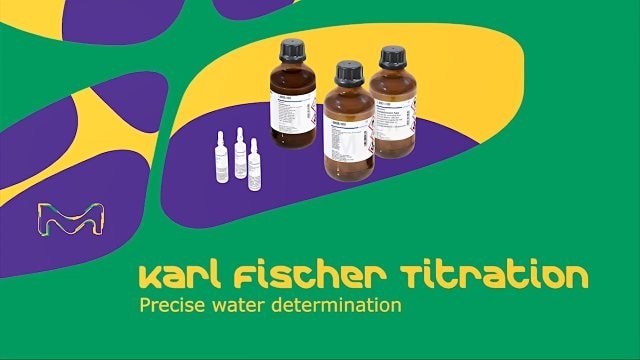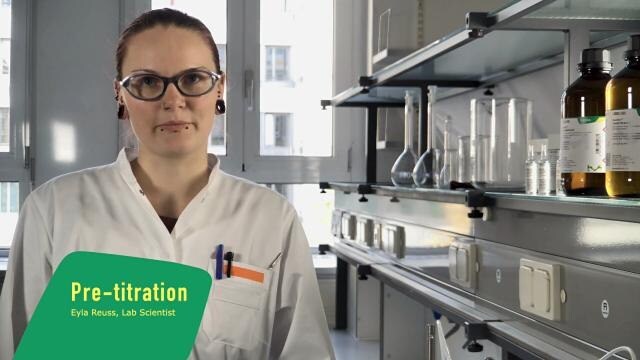Karl Fischer Reagents
Accurate water determination with Karl Fischer titration is an important analytical method used in many industrial segments like Pharma, Food & Beverages, Cosmetics, Petrochemicals and Technical industries to ensure high quality of the products they produce. Using our Aquastar® Karl Fischer reagents and standards the water content of solids, liquids and gas samples can be determined fast, easily and with a high degree of accuracy. Our sophisticated, high-quality Aquastar® portfolio comprises of volumetric and coulometric Karl Fischer reagents and appropriate water standards, Certified Reference Materials (CRMs) according to ISO 17034.
Read more about
Products

Aquastar® Reagents for Volumetric Karl Fischer Titration
The volumetric Karl Fischer Titration method is used to determine the water content accurately by adding iodine-containing titrants to the sample. The sample needs to be dissolved in an appropriate solvent to release the water completely. This method can be used to determine water contents from 0.01 % up to 100 %, and promotes fast, precise, and reproducible results. With our Aquastar® Karl Fischer Reagents, we offer a complete range of high-quality volumetric Karl Fischer Reagents, one- and two-component reagents, and some specialties for specific samples. All titrants and solvents do not contain chloroform.
- Aquastar® Volumetric Reagents – Advantages
- High accuracy and excellent precision
- Reagents for all types of applications
- Rapid titration and reproducible results
- No crystallization
- Innovative formulation for special applications
- Fast conditioning and stable drift
- One-Component Reagents – the one-component titration method has all the reactive compounds such as iodine, base, sulfur dioxide, and the appropriate alcohol required for the Karl Fischer reaction in one reagent, the titrant. Aquastar® CombiTitrants are available in different concentrations to determine higher and lower water contents precisely. Aquastar® CombiMethanol and Aquastar® CombiSolvent are solvents typically used with one-component titrants to dissolve the sample. Our Aquastar® CombiMethanol is perfectly designed for Karl Fischer Titration, it has a low water content of 0.01% and is free of impurities to avoid side reactions. The Aquastar® CombiSolvent is a methanol-free solvent and is usable for all samples which dissolve in ethanol. The one-component titration can be used for all kinds of samples but is preferred for the titration of frequently changing sample matrices and for samples that require the addition of a solubilizer.
- Two-Component Reagents – in a two-component system, the titrant is comprised of iodine and alcohol, whereas sulfur dioxide and a base are dissolved in the solvent. Aquastar® two component Titrants must be used along with Aquastar® two-component Solvent. Two different titrant concentrations are available for higher and lower water content. The two-component Karl Fischer volumetric method shows improved buffer capacity, faster titration rates, and slightly better titer stability. They are often used for series from the same sample matrices or for strong acidic or alkaline samples.
- Reagents for Aldehyde and Ketones – Aquastar® CombiTitrant 5 Keto and Aquastar® CombiSolvent Keto reagents are necessary when performing Karl Fischer titration for water analysis in ketone and aldehyde samples. They cause side reactions when using standard reagents with methanol as solvent. Therefore, they are methanol-free to prevent side reactions and unreliable endpoints.
- Special reagents for oils and fats – oils, fats and long-chain hydrocarbons are usually insoluble in methanol. Additional solubilizers are required to dissolve such samples for the complete release of water. Choose our Aquastar® CombiSolvent Oil, CombiSolvent Fats, or Solvent Oils & Fats reagents for such samples to determine their water contents accurately. They come with additional solubilizer to dissolve samples like mineral oils, kerosene, fuel, vegetable oils, fats, cremes or ointments for Karl Fischer Titration.

Aquastar® Reagents for Coulometric Karl Fischer Titration
Coulometric Karl Fischer Titration is preferred for liquid samples with very low water content, typically in the range of 10 ppm to 10.000 ppm. It is a direct method, and the required iodine is generated during the titration process. Our distinguished Aquastar® range of Coulometric Karl Fischer reagents are available for titration cells with and without a diaphragm. All our coulometric reagents are chloroform-free.
- Aquastar® Coulometric Reagents – Advantages
- High accuracy and excellent precision
- Rapid titration and reproducible results
- Fast conditioning and stable drift
- Only one reagent is necessary for anode and cathode chamber
- Coulometric reagents for cells without a diaphragm – Our coulometric reagents Aquastar® CombiCoulomat fritless, and Aquastar® Anolyte can be used for coulometric Karl Fischer Titration for cells without a diaphragm.
- Coulometric reagents for cells with diaphragm – the Aquastar® CombiCoulomat frit reagent is designed for cells with a diaphragm, while Aquastar®CombiCoulomat fritless reagent can be used in both cells with and without diaphragm. Both reagents contain all reaction components in a single solution and can be added in anode and cathode chamber. The benefit is, only one reagent is necessary.
- Coulometric reagents for aldehyds and ketones – we also offer special methanol-free reagents for aldehyde and ketone samples. Our Aquastar® Anolyte K and Aquastar® Catholyte K reagents can be used to determine exact water content in aldehydes and ketones samples.

Aquastar® Water Standards
The Aquastar® portfolio contains a broad range of excellent water standards for titer determination, monitoring Karl Fischer equipment, and verifying measured results. Our Aquastar® Water Standards are CRMs (Certified Reference Materials) in accordance with ISO 17034 and are measured using validated procedures in our DIN EN ISO/IEC 17025 accredited laboratory. To maintain transparency, we provide a batch-specific certificate of analysis for quality management (QM) documentation.
ISO 17034 certificate: accreditation-certificate-ISO-17034-21-06-2019.pdf (sigmaaldrich.com)
ISO 17025 certifictae: 17025-en.pdf (sigmaaldrich.com)
- Standards are available in solid and liquid formats. Aquastar® Water Standards in ampoules in different concentrations are for the daily titer determinations and instrument checks. Special standards for the Karl Fischer oven method, an oil standard, as well as a lactose standard for the pharmaceutical sector round off the range.

SmartChemicals for Titration and Karl Fischer Titration
Our innovative SmartChemical portfolio enables a connection between the reagents, standards and the titrator. Our Aquastar® Karl FischerTitrants and Aquastar® Water Standards, as well as our Titripur® Volumetric Solutions and Certipur® Volumetric Standards transmit data wirelessly to the titrator. A brief touch on the SmartChemical RFID (Radio Frequency Identification) tag, integrated in the label, eliminates transmission errors, saves time, protects data, and increases efficiency.
Benefits of using SmartChemicals
- Fast and secure data transfer
- Improved efficiency
- Easy to use, easy to implement
- Extended quality management
Related Resources
- Article: Determination of Water in Cannabis & Hemp by Karl Fischer Titration
The article describes Karl Fischer titration (coulometry with oven and direct volumetric titration with external extraction) in comparison to the loss on drying method for accurate determination of water content in hemp samples.
- Article: Supeloc® SmartChemicals for Titration
For volumetric and Karl Fischer titration, with our new SmartChemicals you can eliminate time-consuming steps and errors by transferring data wirelessly and instantly to your titrator.
- Brochure: Accurate Water Determination – Aquastar® Reagents and Standards for precises Karl Fischer results
Karl Fischer titration using our Aquastar® reagents and standards allows for easy and highly accurate water content determination in gases, liquids and solids. It is not without reason that no other method is as widespread as this one: determination of water content according to Karl Fischer is rapid, accurate and reliable; it is therefore the method of choice for quality and in-process control, production, and research and development.
- Brochure: DEA Requirement to Purchase Karl Fischer Reagents (Only for North America)
The United States Drug Enforcement Administration (DEA) controls specific chemicals under the Domestic Chemical Diversion Control Act of 1993. SigmaAldrich requires customers to complete a Sigma-Aldrich DEA List I and II Chemical Authorized Purchaser form for specific transactions before selling DEA regulated chemicals.
- Brochure: Accurate Water Determination
Accurate Water Determination with Aquastar® reagents and standards for precise Karl Fischer titration results.
- Tips & Tricks: Karl Fischer Titration - Measuring Water Content of Samples that do not Easily Release Water
Tips and tricks to completely release water from samples using internal extraction, external extraction and Karl Fischer oven method for accurate determination of water content by Karl Fischer titration method.
- Flyer: Coulometric Anolyte Reagent
Method designed to determine very low levels of water in samples.
- Flyer: Coulometric Reagents for Aldehyde & Ketone Samples
Accurate water determination results with the Karl Fischer method in samples containing aldehydes or ketones
- Flyer: Smart Chemicals
Supelco® SmartTitrants and SmartStandards provide instant and seamless data transfer via RFID tags.
To continue reading please sign in or create an account.
Don't Have An Account?


